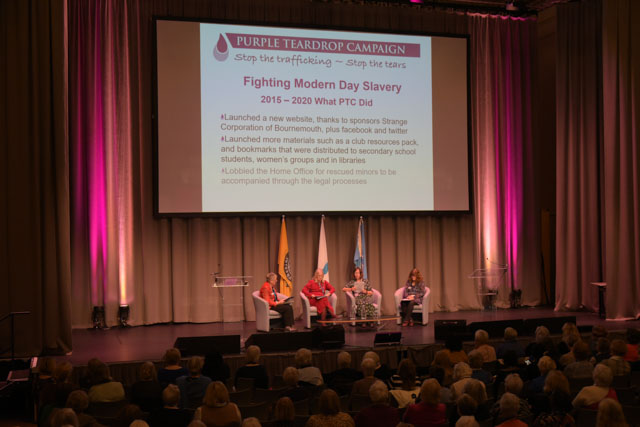Louise Parry, Northwich & District
Where are they now?
Delegates were welcomed by Ann Garvie and the session was introduced by Lindsay Green who reported there were four previous projects to share.
We started with the Meru Project which ran from 2016 – 2019 after SI Canterbury had presented the project to the Glasgow Conference in 2015. SIGBI worked in partnership with CIFORD, in Kenya. The initial fundraising target was £150,000, it was surpassed as £160,740.91 was raised.
The project looked at training, agriculture, nutrition, alternative rights of passage and empowerment for boys. A study visit in April 2018 which included members from SI Canterbury and elsewhere looked at the benefits of the project to the local communities.
After it finished as a SIGBI project a review reported that there had been 600 direct beneficiaries and 5000 indirect beneficiaries identified. The project continues with various sustainable agricultural projects, seminars, a Girls for Leaders Programme and details can be found at www.ciford kenya.org.
The second project was the Purple Teardrop Campaign which ran from 2010 -2015, with the strapline – stop the trafficking – stop the tears.
This was born out a story of a child, Marta, trafficked in a crate – taking 3 months to get to the UK. Far from the promises of working in a hotel, learning English and sending money home to her family, when she arrived in the UK she didn’t know where she was, she was raped on 1st night, and every night following.
The campaign began in 2008 identifying there was no general awareness of human trafficking, so the literature caught people’s imaginations, and the initial aims remained relevant for the 16 years the campaign continued for.
Partnerships were made with organisations including Crimestoppers, Police anti trafficking units and with the Independent Anti-slavery commissioner and these, with the drive and enthusiasm of clubs in federation made it so successful. Posters and literature were distributed, petition sheets were signed all around the Federation, 16000 bras were collected for ‘Free the girls’ and 700 Programme Focus Report Forms were submitted. In addition, the Purple Community Fund collected ring pulls, made them into bags, purses and Christmas decorations to raise money for work in the Philippines.
The key successes identified included the engagement of people and raising awareness; practical and emotional support given to victims, some who were never known, but all of whom were appreciative.
Even though after 16 years the campaign closed, the awareness raised remains and work continues.
Lindsay highlighted there is now a working group on Modern Day Slavery and any members who are interested are welcome to join.
The third presentation was the Kori Development Project started in 2009, after a talk about FGM to the SI Thames Valley Club. The aim was for gifts for the girls and a celebration, instead of them being cut.
Money was raised for a farming project, including being given to the women who were doing the cutting for microloans for rice, and sweet potatoes, to replace the income from cutting. Eventually in 2019 FGM became illegal in Sierra Leone.
Other schemes included a library built in 2012, a primary school and then a secondary school in later years and in 2014 the Kori Project became a charity, so personal donations can be increased by Gift Aid.
There continue to be ongoing requests for help, in 2019 funding was given for a sewing room to teach girls to make washable sanitary towels, this continues and hand/treadle sewing machines are always welcome. There was an orchard planted with monies received in memory of Johanna Raffen, and the project continues to meet needs in the community.
The last project was ‘Safe and Sure’, it started in the Southeast Region in October 2002, born out of a survey carried out by the Tunbridge Wells club on safety in their town followed not long after when a Club member was assaulted on a train.
30 train stations were surveyed, a report was sent to rail authorities, and it was discovered that no one had responsibility for personal passenger safety. This led to ‘It takes a bit of knowing,’ a country wide survey conducted through FPAC in October 2006.
This was followed with a survey on toilet facilities for women on trains, and both these raised awareness of Soroptimist International within the Rail Industry.
Lindsay Green then reported that Federation is going to do a similar survey, but this time for all public transport, ports, airports, trains and buses. Details will be provided in the New Year and will be looking to collect information Federation wide.
How many of us say we don’t know what happens after projects finish? It was, therefore, very interesting to learn of the impact of the chosen projects, and the ongoing benefits.


